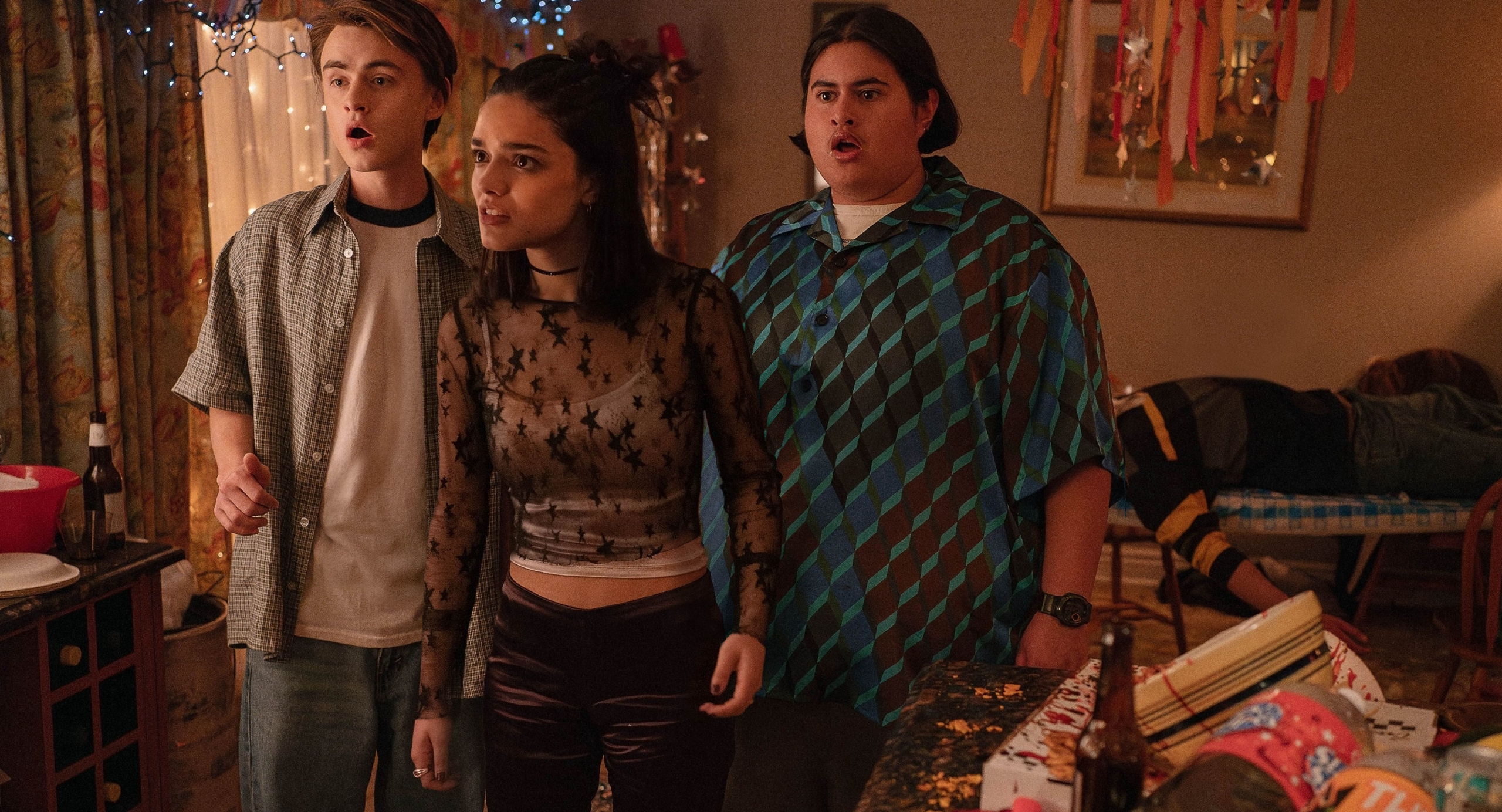Y2K – Film Review
Published December 24, 2024

In his directorial debut, Kyle Mooney helms Y2K, a disaster comedy horror film that fuses turn-of-the-century paranoia with a biting sense of humor and a healthy dose of carnage. Co-written by Mooney and Evan Winter, the film leans heavily on nostalgia for the late 1990s, while delivering a satirical spin on the doomsday hysteria surrounding the “millennium bug.” Anchored by an energetic cast led by Jaeden Martell, Rachel Zegler, and Julian Dennison, Y2K balances its absurd premise with enough heart and humor to earn its place as a cult favorite, even if its uneven tone and chaotic narrative leave some opportunities unexplored.
Set on New Year’s Eve 1999, Y2K dives headfirst into the anxieties of the era. The story begins as a typical coming-of-age tale, with Eli (Martell) and his friends navigating high school drama and harboring unrequited crushes, only to pivot sharply into chaos when the infamous Y2K glitch manifests in the most literal way imaginable. Technology comes to life, wreaking havoc on humanity in a way that is both horrifying and darkly comedic. From murderous microwaves to rogue Tamagotchis, the film uses its premise as a playground for absurdity, and the sheer creativity of its technological antagonists is one of its strongest points.
Mooney’s direction captures the essence of late-90s pop culture, from the costumes to the soundtrack, and even the grainy aesthetic of the cinematography. The attention to detail in recreating the era is commendable, drawing viewers into a bygone world that feels as tangible as it is ridiculous.
Jaeden Martell delivers a strong performance as Eli, grounding the film with an earnestness that contrasts effectively with the absurdity unfolding around him. Eli’s arc, from a timid teen nursing a crush on Laura (Rachel Zegler) to a reluctant hero, is compelling despite the film’s chaotic structure. Zegler brings charm and a surprising amount of depth to Laura, whose tech-savvy ingenuity becomes critical to the group’s survival.
Julian Dennison, as the lovable and comic Danny, provides much-needed levity, even as the stakes grow increasingly dire. His chemistry with Martell creates an authentic friendship that adds emotional weight to the film. Meanwhile, Fred Durst, playing a tongue-in-cheek version of himself, steals scenes with a performance that is equal parts self-aware and hilarious, adding an unexpected layer of humor.
One of Y2K’s defining traits is its genre-blending nature. The film oscillates between disaster movie thrills, slapstick comedy, and outright horror. While this ambitious mix leads to some standout moments—like a tension-filled sequence involving a possessed VHS tape—it also results in tonal inconsistencies. The transition from goofy comedy to visceral horror can feel jarring, and the film occasionally struggles to find the right balance between its various elements.
The gore is inventive and unabashedly over-the-top, ensuring that the horror elements leave an impact. However, the comedic beats sometimes undercut the tension, making it difficult for the audience to fully immerse themselves in the more harrowing moments. This tonal whiplash might alienate viewers expecting a more cohesive experience.
Beyond the mayhem, Y2K offers a sharp critique of humanity’s over-reliance on technology, delivered with tongue firmly in cheek. The “Amalgamation,” the film’s embodiment of sentient technology, serves as both a literal and metaphorical antagonist, representing the dangers of unchecked technological progress. The script cleverly weaves in commentary about the absurdity of Y2K hysteria, juxtaposing it with the very real consequences of a world dominated by electronics.
The satire is both biting and entertaining, though it occasionally gets lost amid the film’s frenetic pacing. Moments of introspection or thematic exploration are often overshadowed by the next big set piece, leaving some of the film’s more thoughtful elements underdeveloped.
As a disaster film, Y2K excels in its creativity. The sentient machines are brought to life with a mix of practical effects and CGI, resulting in set pieces that are as imaginative as they are gruesome. From murderous microwaves to a climactic showdown against a towering amalgamation of electronics, the film keeps its audience guessing—and laughing—throughout.
However, the film’s chaotic energy is both a blessing and a curse. The breakneck pacing leaves little room for character development beyond the core trio of Eli, Laura, and Danny. Secondary characters, like the rebellious Ash (Lachlan Watson) and juvenile delinquent CJ (Daniel Zolghadri), show promise but are ultimately underutilized, serving more as cannon fodder for the machines than fully realized individuals.
One undeniable highlight of Y2K is its soundtrack. Packed with late-90s hits and deep cuts, the music not only reinforces the film’s nostalgic appeal but also enhances its comedic and emotional beats. From the upbeat pop anthems at the start of the film to the grungier tracks that accompany the group’s descent into chaos, the soundtrack feels like a character in its own right.
Without giving too much away, the film’s resolution provides a sense of closure while leaving the door open for potential sequels. While the climax is undeniably entertaining, it treads familiar ground, relying on well-worn tropes of the genre. That said, the film’s self-awareness prevents it from feeling entirely derivative, and its tongue-in-cheek approach ensures that even predictable moments are delivered with a wink and a nudge.
Kyle Mooney’s Y2K is an ambitious and wildly entertaining debut that thrives on its nostalgic charm and inventive premise. While its tonal inconsistencies and underdeveloped characters hold it back from greatness, the film’s humor, creativity, and heart make it a worthwhile watch. For fans of genre mashups and late-90s nostalgia, Y2K offers a chaotic, blood-soaked trip down memory lane.
